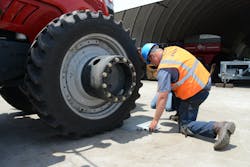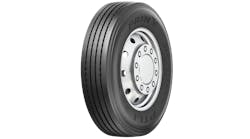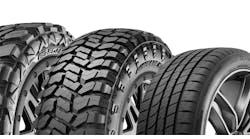When Alton Degenhardt suggested lower inflation pressures of farm equipment tires would reduce soil compaction, his customers were skeptical.
“I had guys tell me it’s never going to work,” says Degenhardt, a third-generation member of the family that owns and operates Degenhardt Tire Inc. in western Wisconsin. “They would say, ‘I don’t know, this seems like a bunch of hocus-pocus.’”
The skeptics have since become believers thanks to technology that allows a tire to carry the same loads at lower inflation pressures or heavier loads at standard inflation pressures than a conventional bias or radial ag tire in the same size.
“Several guys told me they drove around with a full load of corn and beans trying to leave ruts in the field, and they couldn’t,” says Degenhardt. “They never thought that a few pounds of air would make such a difference. They are seeing that there is value in proper air inflation.”
Degenhardt explains that an IF (increased flexion) tire is designed to carry the same load as a standard tire at 20% lower air pressure or carry 20% higher loads at the same air pressure. A VF (very high flexion) tire can carry the same load at 40% lower air pressure or carry 40% more load at identical pressure.
IF and VF technology dates back to the mid-2000s. Michelin was the first tire manufacturer to introduce high-flexing tires in North America with its AxioBib tire, according to David Graden, operational marketing manager-agriculture for Michelin North America Inc.
“Running at a lower air pressure reduces cost of production by improving traction and fuel economy while reducing slip and soil compaction,” says Graden. “Farm machinery has continued to get larger, helping farmers to be more efficient and productive. But with larger, heavier equipment has also come the risk of increased soil compaction which can significantly impact crop growth and yield performance.”
Graden says growers can take proactive steps to manage the risk by being aware of the factors that cause compaction and how to minimize it. “The primary cause is contact pressure, which is exerted by the pressure of tires on the soil surface. Numerous studies have shown the benefits of IF and VF tires that can operate at a lower air pressure under increased loads, compared to standard radial tire technology.”
Until a couple of years ago, growers were showing limited interest in IF and VF tires. Bill Haney, agricultural and industrial sales manager for Apollo Vredestein Tyres North America Inc., notes that IF tires require close monitoring of air pressure. “VF tires answered the requirement for higher load carrying capacity at more standard air pressures,” he says.
In addition, the initial technical specs for IF and VF tires called for wider rims, which made them expensive in the replacement market. “Since then the specifications in many cases changed to allow standard rims,” says Haney. “The point is that lower air pressures are possible in the field for use with ever increasing tractor horsepower and weight. Lower air pressures are the goal for reducing soil compaction. VF tires are a higher load version of the IF concept.”
Focus on service
There are two Degenhardt Tire stores serving growers in Wisconsin. Reuben Degenhardt, Alton’s grandfather, opened a store in Norwalk in 1962. A store in West Salem, about 25 miles away, followed. Today Reuben’s sons, Jim and Pete, own the company. Jim is Alton’s father.
There are five employees, plus Alton Degenhardt’s mother, Roberta, his aunt, Nicki, and two cousins, Jordan and Zach. The retread shop, which has capacity for up to 100 tires a week, uses the Oliver process to retread skid steer and medium truck tires for agricultural use.
The two stores do not offer mechanical service and focus entirely on tires. “We’ll do anything from a 410/350x4 tire for a lawn cart all the way up to a 29.5/R25 OTR tire. And everything in between from tractors, combines, skids steers, and graders,” says Degenhardt.The company also offers mobile road service. Degenhardt’s uncle services the area around the Norwalk store, and Degenhardt covers a roughly 80-mile radius around the West Salem store. A typical day is spent on the road making service calls for customers. “I can change any tire on the road, but we cater to the farmers after hours for emergencies, especially during planting and harvesting.”
Local growers know that if they have an issue, they are not going to be down overnight waiting for a tire. “I’ve got pretty much any farm tire you could want on hand. Anything round and rubber, big and small, we’ve got it all,” says Degenhardt.
Pounds on the ground
Degenhardt is working closely with Patrick McHugh, a grower who is conducting a soil compaction study on his farm. Compaction interferes with a root’s ability to grow into the soil and extract the nutrients and moisture a plant needs. Roots and water cannot infiltrate compacted soil, creating problems for growers.
McHugh uses a device called a penetrometer to measure the resistance in soil in foot pounds. The key metric is the pounds per square inch exerted by a tire on the surface of soil. “I needed to know pounds per square inch. When you first talk to tire people, they talk about how many pounds you put into the tire. Well, I talk about how many pounds are on the ground,” says McHugh.
As part of the study, McHugh has replaced standard radial ag tires on one of his tractors, a Massey Ferguson 8680, with VF tires from Alliance Tires Americas Inc. He is measuring and comparing the amount of compaction under the standard and VF tires. “You need to know the exact weight of that equipment and tire,” says McHugh.
Degenhardt believes he is the only tire dealer in the area using portable scales to weigh farm equipment. He purchased the portable scales in the fall of 2017. He began carrying them with him on visits to customers’ farms, where he weighed equipment and explained how tire pressure could reduce compaction.Degenhardt uses footprint boards, which he makes out of white plywood, to demonstrate to customers how lower air pressure expands a tire’s contact area. The tire is positioned on the board before and after the pressure is lowered and sprayed with black paint to show the number of bars on the footprint board. More bars mean more of the tire is on the ground. “You can see the difference in the number of bars on the footprint board and in the way the machine performs,” he says.
In the spring of 2018, interest in the portable scales “just blew up” along with Degenhardt’s sales of tires for reducing soil compaction.
“You want to get the most value for your dollar out of your tires, so that’s why weighing and making sure your weight splits are correct sets that tire and tractor up for optimum performance,” says Degenhardt. “That’s where you are going to get less soil compaction, better traction and minimal amount of slip percentage. You’re getting more power to the ground and getting more work done with less effort.”
For peak performance, the typical mechanical front wheel drive tractor weight split is 60% on the rear axle and 40% on the front axle. “I usually try to get 125 to 136 pounds per 1 PTO (power take off) HP (horsepower),” says Degenhardt.
Options for growers
Degenhardt first learned about a tire’s effect on soil compaction at a dealer meeting hosted by Titan International Inc. about two years ago. The company’s LSW (Low Sidewall) technology is exclusive to Titan and Goodyear Farm brand tires. Like VF tires, LSW tires can carry 40% higher loads at the same inflation pressure as standard tires, or they can carry the same load as standard tires at 40% lower inflation pressures. But instead of more flexibility in the sidewalls, LSW tires have larger wheel rims and lower sidewalls.LSW tires were developed not only to reduce compaction but to minimize road lope (swaying and bouncing during road transport) and power hop (bouncing while pulling in the field), according to Scott Sloan, ag product manager/global LSW at Titan. “With the LSW tire’s sidewall being physically shorter, we can run lower inflation pressures.”
Sloan says super single tires, which replace dual tires on farm equipment, were developed to reduce soil compaction. Super single tires use both LSW and VF technologies. The company’s most popular sizes are the LSW1250/35R46 and LSW1400/30R46, which is the world’s largest farm tire, according to Sloan. “Replacing two tires on the corner of a tractor with one big tire gives you a lot more surface area, contact area and a lot better flotation and less compaction,” he says.
Degenhardt meets the preferences of individual customers with Titan’s super single tires and Alliance’s IF and VF tires. He says he likes Titan’s Goodyear Farm line because of the unique LSW technology and Alliance tires because they are the only ones in the market with all steel casings and IF/VF technology in standard sizes.
“I’ve done a lot of playing around with air pressure, and it really is the final piece in a lot of situations,” he says. “With the Titan LSW for the super singles and Alliance with the duals I was able to bring everything home,” says Degenhardt.
“It all comes down to looking at what you have for a footprint now and how many more square inches per tire you gain on the ground by going to an IF or VF tire. A guy who wants his duals can have his duals, and a super singles guy can have his super singles.”
For example, one of Degenhardt’s customers puts dual tires on his equipment for planting but removes them for sidedressing (fertilizer application). “LSW wasn’t going to work for him. So I have Alliance VF duals on the back of his tractor and the Alliance IF duals on the front.”
Using both IF and VF tires on the same machine enables Degenhardt to make sure the weight distribution across each axle is correct. The weight split depends on the size of the tractor and the amount of weight it will be carrying. In this case, using a VF tire with a heavier load index on the front of the tractor was not necessary. “You are taking more power and effort than what is required so you are decreasing the efficiency of your tractor,” says Degenhardt. “If you don’t balance the tractor to get the tires to perform, it’s a waste.”Another customer had a pair of duals on the front of his tractor. “We put singles on the front. I weighed it when we set it up. I dropped his air pressure down in the back. He was running 25 psi; he’s running 15 now and 12 in the front,” says Degenhardt. “He told me they could never go full speed on the road because it hopped so badly. But with the air pressure adjusted correctly, he can wind it out all the way and run it at top speed,” says Degenhardt.
The pricing of the two types of tires is comparable. “You can put LSWs on a tractor or put duals on a tractor for about the same amount of money,” says Degenhardt.
Lowering production costs
Larger farm equipment is helping to boost efficiency but it may cause soil compaction that can reduce yield. “Equipment in the last 20 years or so has really gotten big. The size of equipment wasn’t an issue when I was a kid,” says the 39-year-old McHugh.
McHugh has standard radial and bias tires on his other equipment, which includes four tractors used in the field, two combines, a sprayer, several planters and four semi tractor-trailers. He grows corn, soybeans, rye and wheat. His approximately 2,000-acre farm also includes organic production of heirloom corn varieties and small grains for a local distillery.
McHugh says road and field travel is smoother with the Alliance VF tires compared to standard ag tires. The Alliance tires also proved themselves as far as reducing compaction. “We see less of a footprint in the field, not only visually but scientifically,” says McHugh. “The tractor we have the VF tires on actually weighs more than the other tractor. From what I’m seeing from my studies, we’re leaving less of a footprint with the heavier tractor because of the tires. It’s nice to see this technology. The pros of tires are that they are much lower maintenance compared to a track system.”
In addition to traditional metrics like bushels per acre, growers like McHugh are focused on lowering their production costs. For example, controlling wheel slippage, which occurs when the tires are turning faster than the ground speed of the tractor, helps save fuel. Lowering inflation pressure enlarges the tire’s footprint, which increases traction and fuel economy and lessens compaction.
“Slip is wasted horsepower,” says Degenhardt. “The less slip percentage you have, the less wasted fuel and the less wear and tear on the tractor. With less slip percentage you are going to burn less fuel per hour, there’s going to be less wear and tear on the machine.”Degenhardt tells his customers they can’t do anything about rain and sunshine, but they can minimize their input costs by using properly inflated tires. “The way I look at it, they are going to save money on fuel and potentially save money on repairs. They can minimize input costs with more efficiency, so they cover more acres per hour and use less fuel per hour.”
James Crouch is national product manager-agriculture for Alliance Tire Americas. He says farmers are starting to see the advantages of IF and VF tires. “The opportunity to choose between benefits — carrying more load at the same inflation pressure or carrying the same load at a lower inflation pressure — is really powerful. As farmers get more engaged in improving the efficiency of every aspect of their operations, they are including tire choice and inflation pressure along with their decisions on other inputs, from seed to fertilizer to chemicals, that affect crop yields and profitability.”
Crouch notes that there are substantially more options for IF/VF tires than ever before. “Just from the Alliance perspective, we have more than tripled our IF/VF offer this year alone. All the major manufacturers seem to have clearly aligned their future product plans to bring low-pressure solutions to as many areas as possible.”
The implement market has transitioned from the demand being super-low-cost commodity bias tires to IF/VF radials seemingly overnight, according to Crouch. “For years, there has been a demand for something better than a cheap bias because of the incredible loads imposed on implements now, as well as the amount of roading they do. When a large planter or tillage tool is folded up into the transportation configuration, the load placed on the primary tires is incredible. A bias tire simply is not built to withstand it. We believe that the trend to IF/VF implement tires is going to dramatically increase over the next few years as more brands offer these solutions to the market.”New products planned
Modern Tire Dealer asked manufacturers for an update on products designed to help reduce soil compaction. Along with Crouch from Alliance, Haney from Apollo Vredestein, Graden from Michelin and Sloan from Titan, five other tire makers responded. They are: Dave Paulk, manager-field technical services for Balkrishna Industries Ltd. (BKT); Brad Harris, manager of global agricultural field engineering for the Firestone Ag unit of Bridgestone Americas Tire Operations LLC; James Enyart, manager of technical services for CEAT Specialty Tires (Cavi Elettrici e Affini Torino Ltd. (CEAT) is part of the RPG Group); Rick Harris, regional manager-U.S. for Global Rubber Industries Pvt. Ltd. (GRI); and Norberto Herbener, OEM technical manager for Trelleborg Wheel Systems Americas Inc.
Not all respondents have IF/VF tires on the market yet. Enyart says CEAT has plans for IF and VF production to reach the market late in 2019. Harris says GRI will have the capacity to produce IF/VF tires at its Sri Lanka plant by early 2019. Continental Corp. is ramping up development and production of VF tires in Lousado, Portugal, with an anticipated launch at the end of 2019.
“The share of high-flexion tires has increased over the last few years and trends show a larger growth in the upcoming years,” says Andreas Emde from the product development and product industrialization for agriculture tires group at Continental Commercial Specialty Tires. “More and more machines have been equipped with high-flexion tires by original equipment manufacturers and now these tires need to be exchanged. For our market launch, we will focus on the main tractor sizes as well as on harvester steering tires.”
Demand for implement tires
MTD asked manufacturers if demand for IF/VF tires was increasing in any sizes, applications or implements and if so, why? Their responses follow.
Alliance: IF and VF tires have had a long, steady increase in the tractor and combine segment—big, high-visibility tires on machinery where it’s easy to see the benefit of greater load-carrying capacity and lower inflation rates.
Alliance has introduced tires in those categories, all the way up to a massive IF 1250/50R32 CFO combine tire. Over the past few years, we’ve also added an emphasis on IF and VF row crop tires for self-propelled sprayers. That’s another application where the added load capacity and a longer, flatter footprint really make a huge difference.
What’s really exciting now is our expansion into implement sizes. Air seeders, planters, carts, and even tillage equipment can be extremely heavy, which causes soil compaction. Until recently, farmers could use IF, VF and flotation tires to minimize the compaction caused by their tractors, combines, grain carts and manure tanks but then go back out on the field with an air seeder that weighs 20,000 or more pounds, running on highly inflated tires, and cause the exact problem they had been trying to avoid. With the introduction of Alliance VF implement tires over the past year or so, farmers can go all season on low inflation pressure and minimize their compaction from spring fieldwork through harvest.
Apollo Vredestein: Both IF and VF are increasing in popularity for very large tractors. Typical applications are 4WD (four-wheel drive) tractors (8 equal size tires) and large MFWD (mechanical front wheel drive) tractors, many coming here from Europe. Implements such as grain carts and heavy tillage tools are also starting to use them.
BKT: The demand for IF/VF tires seems to continue gaining steam. More are being used as original equipment on implements and sprayers. Most heavy self-propelled sprayers are coming with IF or VF tires to carry the heavy weight and 40 mph speeds that they run. More IF and VF tires are being used on implements as they get bigger and heavier. The sizes are taller and wider. The demand for these tires will only increase as equipment changes.Bridgestone: IF/VF tires are more often used in applications that require heavy axle loads, like high-clearance sprayers, combines, grain carts, and transport tires on large implements. As customers require more and more productivity from the equipment they purchase, equipment manufacturers are meeting the need for more capacity. When equipment gets bigger or has more capacity, the axle weights increase. Heavier loads require either larger tires or an increase in inflation pressure to carry the load. A high-clearance sprayer with 120-foot booms and 1,200 gallons of liquid requires each tire to carry 12,000 to 14,000 pounds. Class 8 and 9 combines’ front axle weight can exceed 65,000 pounds with a 40-foot draper platform or 16-row corn head with 400 bushels of crop in the bin. Implements that are 50- to 60-feet wide in the field have to fold narrower for road transport, which transfers the implement’s weight to the four tires. These applications are using IF or VF tires to carry the increased weights while minimizing the need for more inflation pressure.
CEAT: This technology fits the self-propelled row crop sprayer market extremely well with the development of GMO row crops. Due to the additional trips across the fields with herbicide applications, the row crop sprayers have increased in size to improve efficiency and help get the applications completed on a more timely basis. These sprayers are running the same tracks with each application so it became much more important to carry these large loads and to minimize compaction.
Implement tires are a more recent development for the IF and VF tires. The largest planters along with other heavy implements have always had trouble carrying these big loads. Larger equipment has led to adding additional tires to manage these loads. Incorporating the IF and VF tires on these large, heavy implements can provide the load carrying capacity and reduce the compaction compared to the standard bias or radial implement tires. Planting windows seem to be tighter than ever and reducing down time has become more critical. Adopting the IF and VF tires for these large planters does reduce potential down time and of course allows the planting operations to proceed under less than ideal conditions.
GRI: IF/VF started with row crop, sprayer and flotation R1 and is expanding in all sizes including radial implements. Manufacturers are now adding more sizes as IF/VF advantages increase service life and reduce overweight failures/adjustments.
Michelin: Demand is increasing for more applications, fitments and implements. Today’s latest tire technologies enable farmers to carry a heavier load at the same air pressure compared to standard radial technology, or the same load at a lower pressure. In addition, a larger tire footprint allows for better traction in the field, less slippage and improved fuel economy. Michelin offers a portfolio of IF and VF tires for tractors, sprayers and harvest machines in a selection of sizes.
Trelleborg: All tire manufacturers are continuously introducing more sizes under IF and VF technology. As new equipment is launched in the market and their power and weight increase, they require larger tires and/or tires that can hold more load. The fastest segment adopting the IF/VF technology is the sprayers, followed by large tractors.
Advancements in technology
MTD also asked manufacturers for an update on their latest IF and VF technologies.
Alliance: IF and VF tires are very demanding to design and manufacture; they require state-of-the-art compounds, and everything from the bead to the tread has to be built to exacting standards. At Alliance, we’ve combined the expertise we’ve developed in IF and VF tires with our decades of leadership in flotation tire technology to help pioneer the VF flotation tire category.
To complement our IF and VF R-1 and R-1W tires, we introduced the Alliance Agriflex+ 389, which is the world’s first VF flotation tire. This tire can operate at up to 30% less pressure than a standard radial flotation tire, and it is also optimized for use with a central tire inflation system (CTIS). We are looking ahead and seeing how we can further reduce compaction, and combining our advanced tire technology with CTIS is one of the next big steps.
Apollo Vredestein: Vredestein has embraced the VF technology, offering Vredestein Traxion Optimall as our VF tire. The Traxion Optimall, introduced in November 2017, allows lower inflation pressure in the field and a larger footprint than our current IF offerings.
BKT: BKT has a VF sprayer tire (Spargo) that is rated to run at 40 mph. It is also rated to carry the heavy weight needed for sprayers. We have added several new sizes to this lineup. We make IF tires in the Rib 713 (radial implements) in 15-inch sizes. We make VF tires in the SR713 in a couple of 22.5-inch sizes. We are making a couple of IF/VF sizes in the AW711 (radial implement) in 17- and 18-inch sizes. We continue to add sizes to these groups as demand increases for them.
BKT’s Agrimax Force is an IF rated tire made for higher horsepower tractors and rated to run at 40 mph. The Agrimax V-Flecto is a new VF tractor tire that BKT is building with lower aspect ratios. We continue to add sizes as needed.
Bridgestone: The latest advancement in the technology has been the release of IF/CFO tires. CFO stands for Cyclic Field Operations, which is the service found on combines and grain carts. On combines and grain carts, the grain bin is filled and emptied in the field, changing the axle weight in a cyclical pattern. IF/CFO tires are designed to carry the heavier loads found on the Class 8 and 9 combines without needing 50 to 60 psi. These tires are also used on single-axle 1,300-bushel grain carts.
Michelin: New central tire inflation systems (CTIS) are being used in conjunction with IF and VF tires. CTIS enables a tractor operator to change tire pressures on the go for optimum performance when changing from road conditions to field conditions. Footprint boards placed under the tires will showcase differences in tire footprints from road to field. The tire pressure can be adjusted with the touch of a button on the tractor’s control panel. CTIS is widely used in Europe and has been increasingly used in North America to minimize compaction and increase traction, fuel economy and tire performance.
Trelleborg: In addition to new IF and VF tire sizes released, Trelleborg is advancing this range by combining it with Trelleborg technology. Each new tire is developed with the patented ProgressiveTraction design to improve traction, inter-lug terraces for superior self-cleaning, and side wings for a wider footprint. A wider footprint on the same tire size reduces pressure on the ground and directly reduces soil compaction. ■
To see farm tire market shares, click here.




